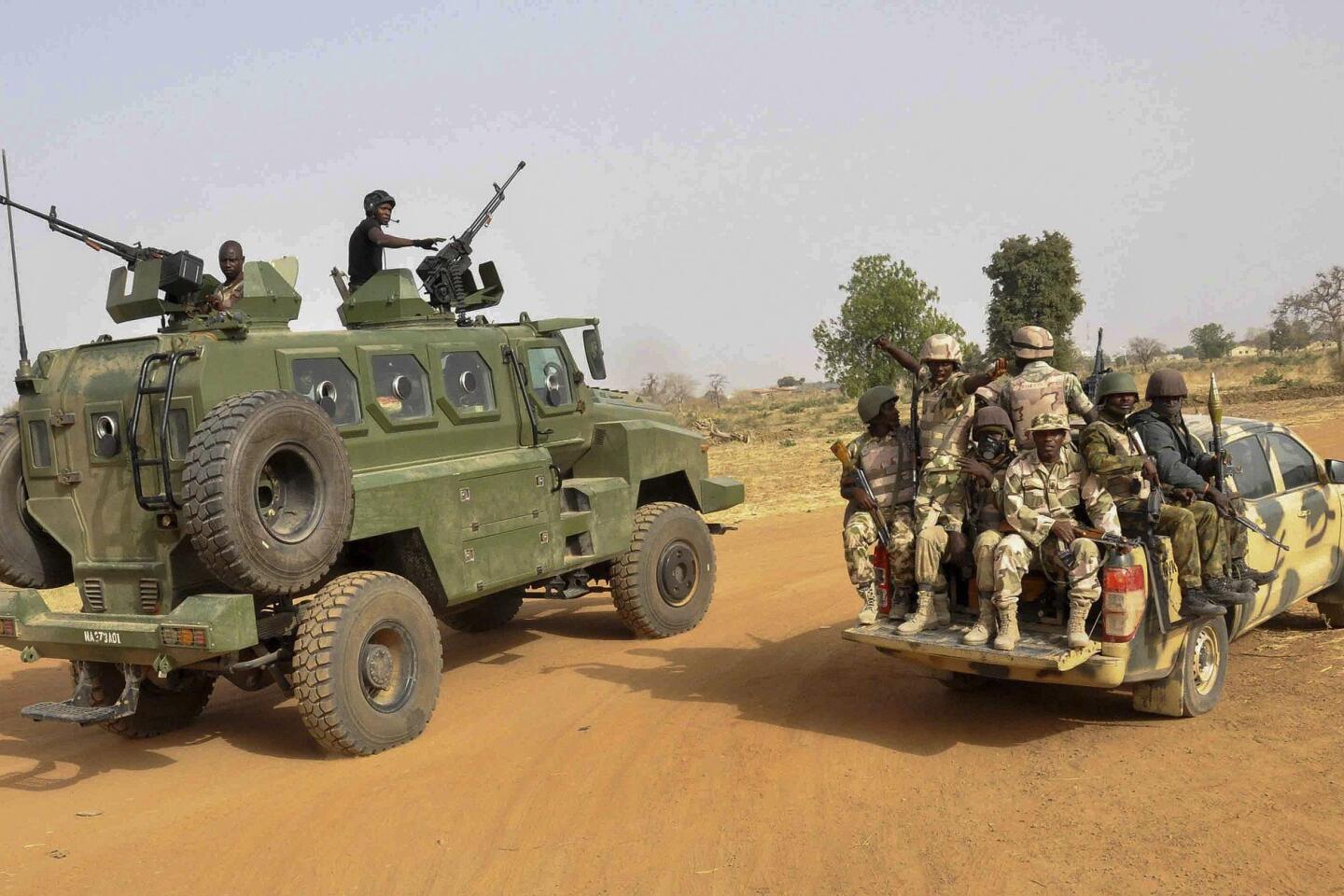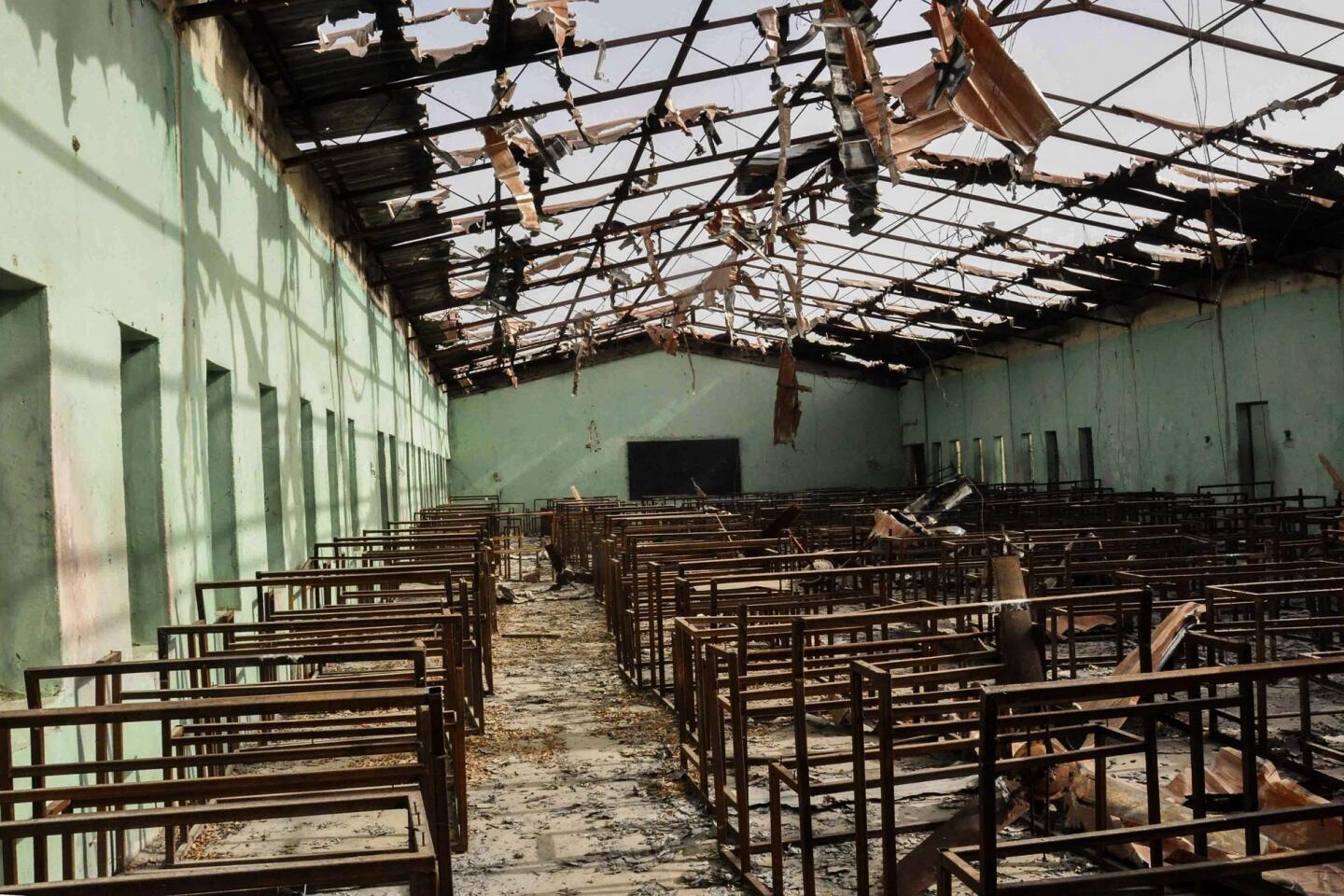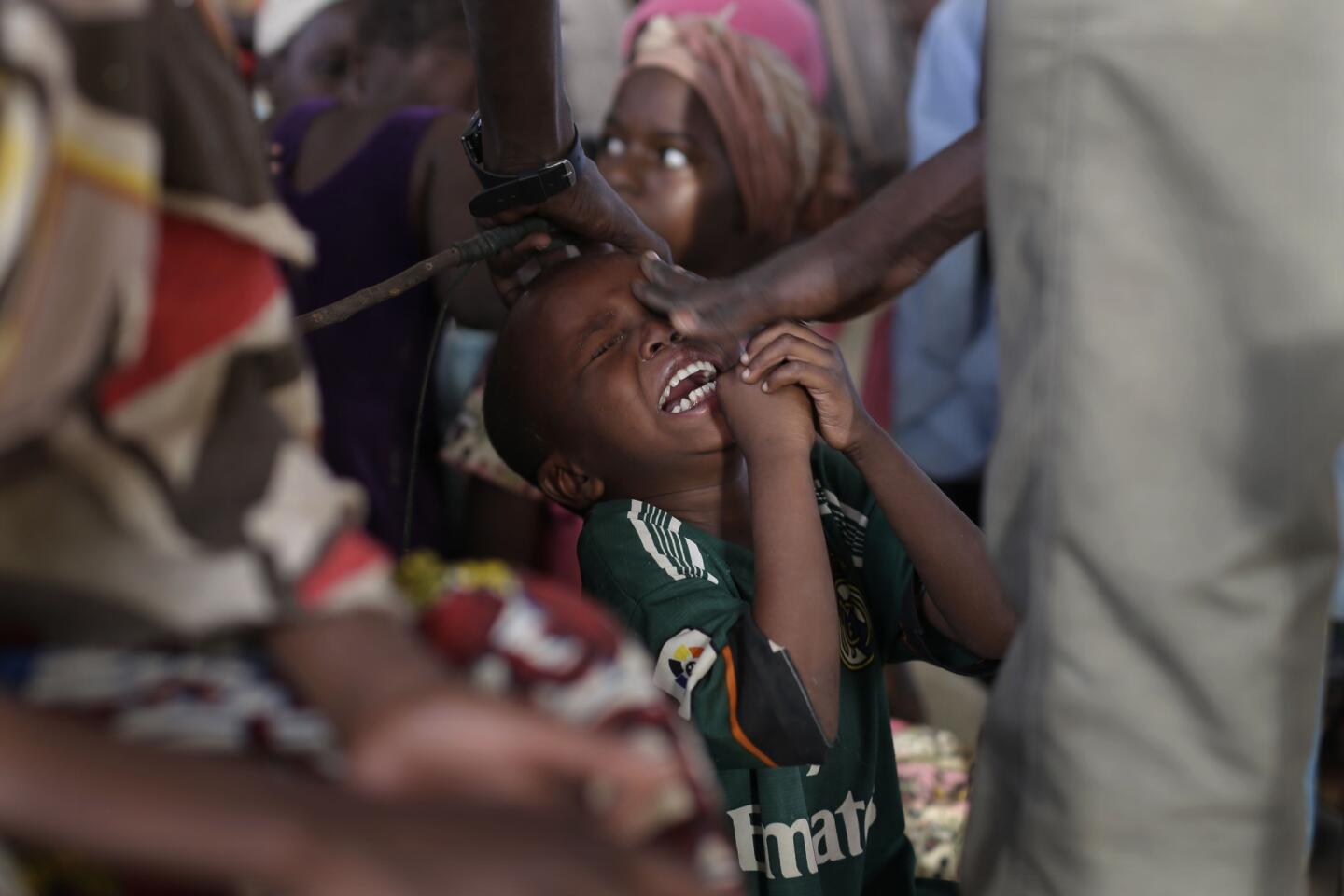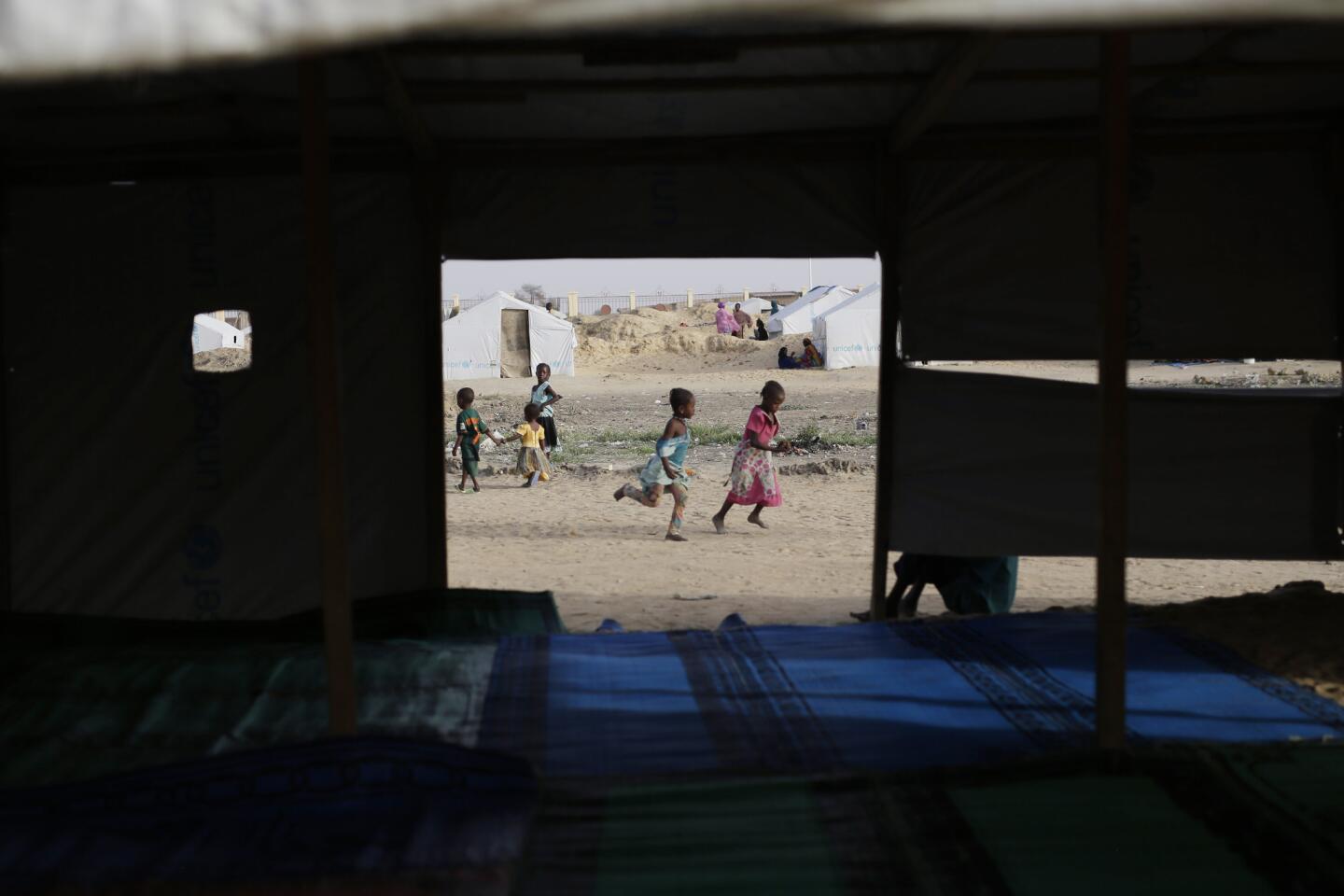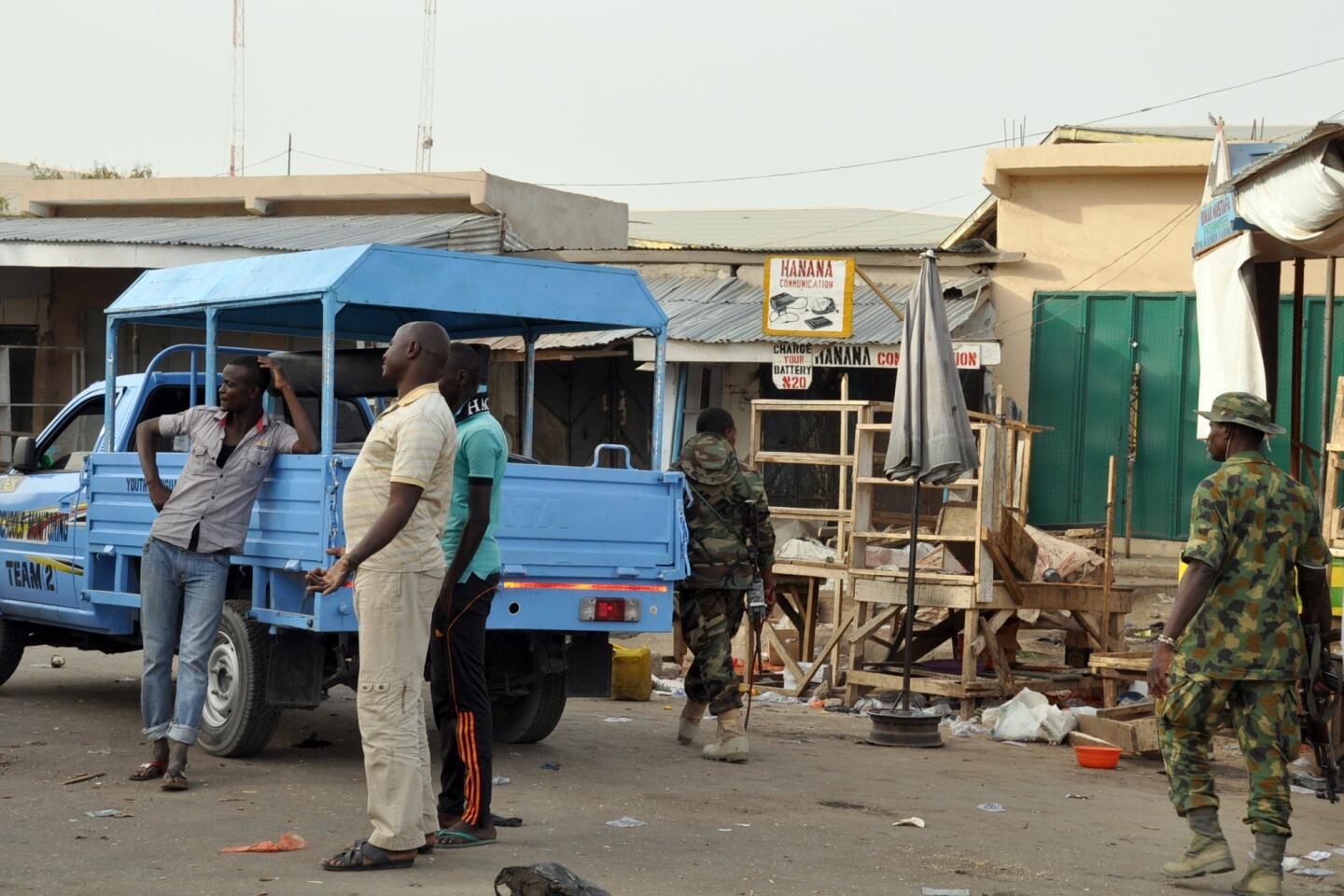Months after #BringBackOurGirls, Boko Haram kidnapped hundreds more children. Local officials kept it quiet.
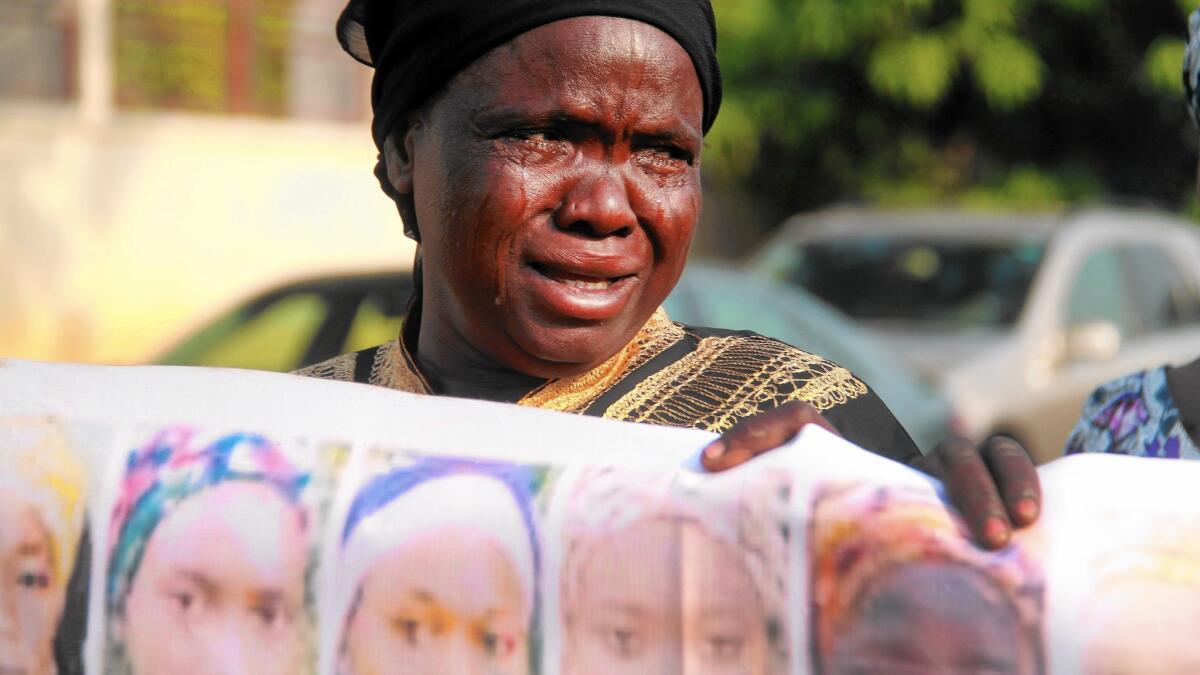
The mother of a girl abducted by Boko Haram takes part in a rally in Abuja, Nigeria, in January 2016.
- Share via
reporting from KANO, Nigeria — The children had gone off to school and the traders were still arranging their goods at the village market in the remote fishing town of Damasak when the Islamic fighters swept in, shooting as they pushed straight for the schoolhouses.
By the time the Boko Haram invaders were done, at least 400 people had vanished, many of them children.
The Monday morning invasion in November 2014 was reminiscent of the attack seven months earlier when the terrorist group stormed the village of Chibok, kidnapping hundreds of girls, shooting residents and burning homes. When the savagery of that attack became known, it sparked a sense of global urgency and drew worldwide condemnation.
But this time, after the children of Damasak were whisked away and the survivors were left to bury the dead, there was only silence.
Now, on the eve of the second anniversary of the attack on Chibok, the raw details of what happened in Damasak, elsewhere in Borno state, are emerging in interviews with survivors, village leaders and government officials, most so afraid of reprisals that they refuse to be named.
“I’m in agony because those children taken, especially my 16 nephews, are like my own children,” one local chief said. “I feel like a bereaved father.”
As hundreds of bodies were found in Damasak this month, Gana Mustapha, a spokesman for the Borno state governor, described the attack as horrific. He told local media that “the level of devastation in Damasak is high. We have seen hundreds of people that were massacred by Boko Haram.”
As with Chibok, most of those kidnapped in Damasak have not been found.
The similarities between the two raids, however, would seem to end there. Backed by the U.S., efforts have been made to find the children of Chibok. But a new Human Rights Watch report concludes that there’s little evidence Nigerian security forces even made a serious effort to locate the Damasak victims.
The Chibok abduction generated so much heat that local officials and leaders in Damasak kept quiet about what happened there, even denying the incident when contacted by journalists at the time.
“My 7-year-old child was among the children kidnapped,” a government official in a Maiduguri camp for displaced people said in a phone interview. “The Boko Haram abductors struck nine days after I enrolled my child in the school.”
For years, Boko Haram has rampaged across northeastern Nigeria, occupying towns and villages, taking advantage of the weak government and an army that was often unwilling to fight. Beyond the mayhem, its stated mission is to impose Islamic rule and oppose all Western influence, from banks to secular education. It draws its fighters and support mainly from Kanuri people, an ethnic group in northeastern Nigeria, northern Cameroon and southeastern Niger who have long felt marginalized by governments.
The militants tend to attack on market days, when villages are filled with farmers, fishermen and traders. They storm in on motorbikes and in SUVs and armed personnel carriers, roaring up to the market squares, government headquarters and police stations and gunning down the men and boys.
Even given Boko Haram’s capacity for violence, the attack in Damasak was chilling.
The invaders went to the main schools in town — El Minnur, the private school attended by the children of the town’s elite; the government primary school for the poor children; and the government-funded Islamiya comprehensive school for the homeless ones.
As the group fanned out — some grabbing women and children, others raining down violence on the village — some residents tried to flee, swimming across the river to Niger. Some drowned, according to the witnesses, while others were shot. The chief whose 16 nephews were abducted said he and his family escaped across the river by canoe when they heard the shooting.
“They went on a killing spree,” he said. “I was among those who returned and buried over 200 dead bodies in mass graves.”
Some women were abducted with their children only to be separated from them by the gunmen, according to Human Rights Watch, citing witness accounts. Women could hear their children crying, but could do nothing.
“I have not seen my children since then,” said one mother, who lost a 4-year-old son and 2-year-old daughter. None of the Damasak children have been found, according to residents interviewed by The Times and Human Rights Watch.
A teacher said he and others were forced to carry dozens of bodies to the river and to dump them there. Local authorities reported finding at least 470 bodies in makeshift graves, according to the report.
Another Damasak resident said in a phone interview that everyone in the town knew at least one of the children.
“We operate as an extended family system, and there is no family that is not affected by the kidnapping. My friend’s son was among the children taken from El Minnur private school, and it is as painful as if it was my child,” the resident said.
Several Damasak leaders said they reported the abduction to the region’s lawmakers, but it seemed clear Nigerian authorities were tired of the sort of attention that Chibok drew.
“We kept quiet about the kidnapping for fear of drawing the wrath of the government, which was grappling with the embarrassment of the kidnap of the Chibok schoolgirls,” said a local official in a phone interview.
“We got the message clearly. The government didn’t want the news out and whoever leaked it would have himself to blame. This was why some of us contacted by journalists denied the story, because they were afraid what the consequences would be if they were identified.”
A local chief said people felt helpless, getting little response after reporting crimes to local political leaders. “They didn’t take any action and there was nothing we could do. We didn’t have anyone else to turn to,” he said.
Nigerian authorities compiled a list of the names of the missing Chibok girls, but not of the thousands of other women and children who have been abducted over the years, according to rights groups.
See more of our top stories on Facebook >>
Two years after Chibok, 219 of the kidnapped girls are still missing, a small fraction of the thousands of women, girls and boys reported to have been abducted since. Amnesty International last month reported that Boko Haram in 2015 and 2016 had abducted at least 2,000 women alone. A UNICEF report released Tuesday said many of the missing children, some as young as 8, were forced to carry out “suicide” bombings.
Many have been critical of the Nigerian government’s failure to do more to recover the abducted children.
“We appreciate the government for the renewed military offensive and the gains recorded in the fight against Boko Haram. Yet, we had expected that this success would be translated into tracing the whereabouts of our girls or even finding some measure of closure for us, their parents,” Nigerian pastor Tunde Bakare said in a speech Sunday.
Nigeria’s military has now driven Boko Haram out of its strongholds in cities and towns, leaving it seriously weakened. Highways closed for years after attacks were reopened in February.
But trade is still stagnant and the farming and fishing industries paralyzed, and the military is unable to guarantee security across vast stretches of territory.
Boko Haram has proved resilient, though. It has been weakened before, only to regroup and come back with a vengeance.
Special correspondent Abubakar reported from Kano and Times staff writer Dixon from Johannesburg, South Africa.
MORE WORLD NEWS
Judge rules against China’s first-ever same-sex marriage case
As Baja resumes bullfighting, Mexicans debate: Is it an art form or a cruel, outdated ritual?
Kenya deports 45 Taiwanese prisoners to mainland China, and Taiwan accuses Beijing of abduction
More to Read
Sign up for Essential California
The most important California stories and recommendations in your inbox every morning.
You may occasionally receive promotional content from the Los Angeles Times.
